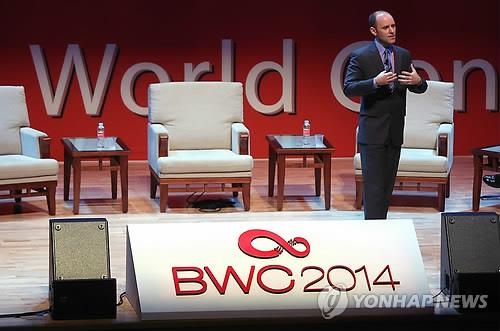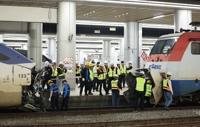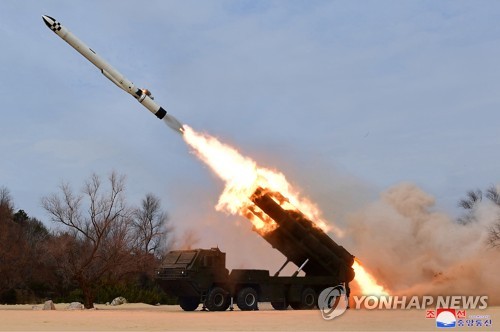(ITU) (Yonhap Interview) Cisco eyes next 'smart city' project in S. Korea
By Kim Eun-jung
BUSAN, Oct. 23 (Yonhap) -- Cisco Systems Inc., a U.S.-based networking leader that transformed a reclaimed piece of land in the Yellow Sea into a high-tech city, wants to expand partnership with South Korea to create the next "smart city," a senior official said Thursday.
Cisco was the digital mastermind of the US$35 billion project that supplied network-based technologies to build a "smart, connected city" in Songdo, just west of Seoul, in 2009.
Dominic Scott, vice president and national engagement strategist for the Asia-Pacific at Cisco Systems, said his company's joint partnership with the Incheon Free Economic Zone has made a good start in the world's most-connected nation and he hoped to work with other local governments to present new way of life in urban communities.
"Songdo was really a starting point to show what's possible. I think there is a lot of potential in this country," Scott said during an interview with Yonhap News Agency during his visit to Busan to attend the Big Data Conference.
Seeing smart cities as a huge business opportunity, Scott said his company will continue to work with the Korean government and companies to develop a long-term partnership.
"We're very excited about the possibilities of collaborating with cities around Korea to help roll out smart, connected cities," Scott said. "We're committed to partner with Korea. We're not just here to make money and leave. We're here for the long term."
Scott said he had consultations with Busan officials during his visit here to explore ways to transform South Korea's largest port city, with a population of 3.5 million, to make it more effective and connected.
When working on cities with different culture and background, there's no one-size-fits-all solution, he said.
"Songdo is a brand new city and there was nothing but the green field, while Busan is a city with history and great culture. It is important how one can look at this technology, not just to create a new city, but to transform old cities."
Scott said Koreans who are eager to create new lifestyles through technological innovation were behind the country's unprecedented economic development over the past decades.
"This is a country with people who really embrace new technology and really think how to use that technology to transform the way you live, you work, you play, you learn, everything," he said.
Work is underway to build what he called "Internet of Everything (IoE)" center in the nation to bring together people, data, and things to make networked connections, he said. The move comes after South Korean President Park Geun-hye met with Cisco Systems Chairman John Chambers during the World Economic Forum in Davos in January.
"Seoul obviously has been the economic heart of the country, and I know there are lots of new opportunities being used," Scott said. "Whether it's Seoul or other areas, I think there's a lot of opportunities in the country for Internet of Everything in Korea."
Scott, who still remembers Seoul streets with no foreign cars in the 1980s, called the country's rapid economic development a "world success story," saying it is time to open up the market.
"I think Korea has grown enough to open the market to foreigners and not feel that the culture is going to be threatened."
He said it's critical that Asia's fourth-largest economy adopts international technology standards available across the world to take the next step.
"It's important to implement policies and things like security, which ensure security for Korea but will not end up closing the market by adopting standards that are not common to the rest of the world. I think there's a little bit of risk of that here in Korea," he said.
In South Korea, anyone wishing to carry out financial transactions online must install ActiveX, a software framework, on their computers. The system, initially designed to enhance Internet security, is cited as a major inconvenience by shoppers, especially foreigners, as it does not work on all Web browsers, including some mobile platforms.
Another challenge for Korea is the overwhelming influence of family-controlled conglomerates, so-called chaebol, the official said, urging more technology support to foster local businesses and start-ups.
"This is a market that is still heavily dominated by a small number of chaebols. I think it's a big challenge here, too." Scott said. "Think about how to use this technology and how to use these opportunities to really grow small- and medium- businesses here. That's where the next wave of innovation will come from in Korea."
ejkim@yna.co.kr
(END)
-
 Overdue debut of Korean abstract art pioneer Yoo Young-kuk at Venice Biennale
Overdue debut of Korean abstract art pioneer Yoo Young-kuk at Venice Biennale -
 Defense chief says N. Korea's hypersonic missile 'unsuccessful' in last-stage glide flight
Defense chief says N. Korea's hypersonic missile 'unsuccessful' in last-stage glide flight -
 Relax, immerse yourself in scents at Venice Biennale's Korean Pavilion
Relax, immerse yourself in scents at Venice Biennale's Korean Pavilion -
 N. Korea has capability to genetically engineer biological military products: U.S. report
N. Korea has capability to genetically engineer biological military products: U.S. report -
 S. Korea marks 30th anniv. of Korean Pavilion at Venice Biennale with contemporary art
S. Korea marks 30th anniv. of Korean Pavilion at Venice Biennale with contemporary art
-
 Overdue debut of Korean abstract art pioneer Yoo Young-kuk at Venice Biennale
Overdue debut of Korean abstract art pioneer Yoo Young-kuk at Venice Biennale -
 Relax, immerse yourself in scents at Venice Biennale's Korean Pavilion
Relax, immerse yourself in scents at Venice Biennale's Korean Pavilion -
 Artist Lee Bae captures ethereal Korean aesthetics at Venice Biennale
Artist Lee Bae captures ethereal Korean aesthetics at Venice Biennale -
 S. Korea marks 30th anniv. of Korean Pavilion at Venice Biennale with contemporary art
S. Korea marks 30th anniv. of Korean Pavilion at Venice Biennale with contemporary art -
 Defense chief says N. Korea's hypersonic missile 'unsuccessful' in last-stage glide flight
Defense chief says N. Korea's hypersonic missile 'unsuccessful' in last-stage glide flight
-
 Facebook page unveils photos of BTS member V in counter-terrorism unit gear
Facebook page unveils photos of BTS member V in counter-terrorism unit gear -
 Gov't likely to accept university chiefs' request to lower med school enrollment quota
Gov't likely to accept university chiefs' request to lower med school enrollment quota -
 S. Korea not invited to G7 summit meeting this year: sources
S. Korea not invited to G7 summit meeting this year: sources -
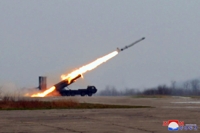 N. Korea says it conducted 'super-large warhead' test for strategic cruise missile
N. Korea says it conducted 'super-large warhead' test for strategic cruise missile -
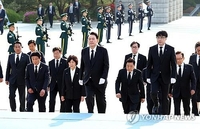 Yoon's approval rating sinks to lowest point since taking office
Yoon's approval rating sinks to lowest point since taking office
